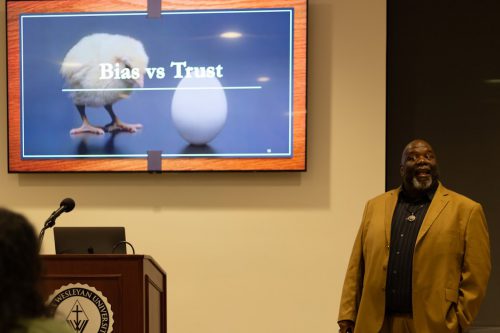Featured Image: NSU professor Dr. Perkins presents his annual lecture covering the conflict between bias and trust. Laila Jones | Marlin Chronicle
Norfolk State University professor, Master’s Program Coordinator and member of several Norfolk organizations focused on justice and eliminating bias, explored the relationship of trust between law enforcement and communities.
In the talk entitled, “Elusive Trust: Unconscious Bias between Police and the Communities They Serve,” Dr. Robert Perkins took listeners through the guiding questions: “Why do so many communities not trust the police?” and “Why do so many police not trust the communities they serve?” in a talk hosted by the Robert Nusbaum Center on Nov. 2.
“Trust is a two-way street,” Perkins said. To emphasize the extent of harm that mistrust can cause, he showed a slide of victims of police brutality and a slide of officers killed on duty.
In light of this discussion, VWU students speak on the relationship of trust between police and communities.
“The relationship between communities and police is a fragile one. I believe the solution is education. There is lots of work that needs to be done.”
- Senior and event attendee James Johnson
“After the death of George Floyd, many communities have had little trust in the police and its systems. Not all cops are good cops. Not all cops are cops for the right reasons. Some police may also have biases based on someone’s race or appearance which may make them act or react in a certain way. There is a mistrust between the two. Policing does not work unless there is a common trust.”
- Sophomore and Criminal Justice major Madison Hayes
“I think one of the main reasons that police and the communities they serve do not have a mutual trust in each other is due to implicit biases that each group holds towards each other. Bias guides our lives, whether we like to admit it or not. As for when it comes to the community, cops always have to make split second decisions, and at the end of the day, they want to go home and see those they care about, just like the rest of us. Either choice a cop can make will be a lose-lose situation, in some cases.”
- Sophomore and event attendee Zachary Heldibridle
“Many communities don’t trust the police because of the structure and how their imagined purposes are different from their actual purpose. The first police force in America was the slave-catching force and their purpose essentially hasn’t changed. Their purpose is to protect the rights of property owners, not protect citizens or prevent crime. The United States has the largest incarcerated population per capita in addition to the highest recidivism rate globally, and prison labor accounts for billions of dollars in stolen wages in railroads, manufacturing, and other fields. The system is not broken, it is working exactly as designed.”
- Sophomore and President of Students Against Continued Homelessness (SACH) Aidan Foley
“I believe so many communities don’t trust the police because of the recurring issues of police brutality that affect all groups, especially people of color … Communities also focus on whether or not the actions of police incorporate justice and legitimacy instead of being racially motivated or turned into another George Floyd situation. Vice versa, police also don’t trust the communities they serve based on the way the community acts. The mentality of a lot of police officers reflects the way they are going to treat their community. … I also believe so many police officers don’t trust the communities they serve because of the media. … They can see lots of hate towards them even if they weren’t in the situation because of the continued violence and hate to others in different communities.”
- Sophomore and SACH representative Isaac Nathaniel Samuel
By Lily Reslink

